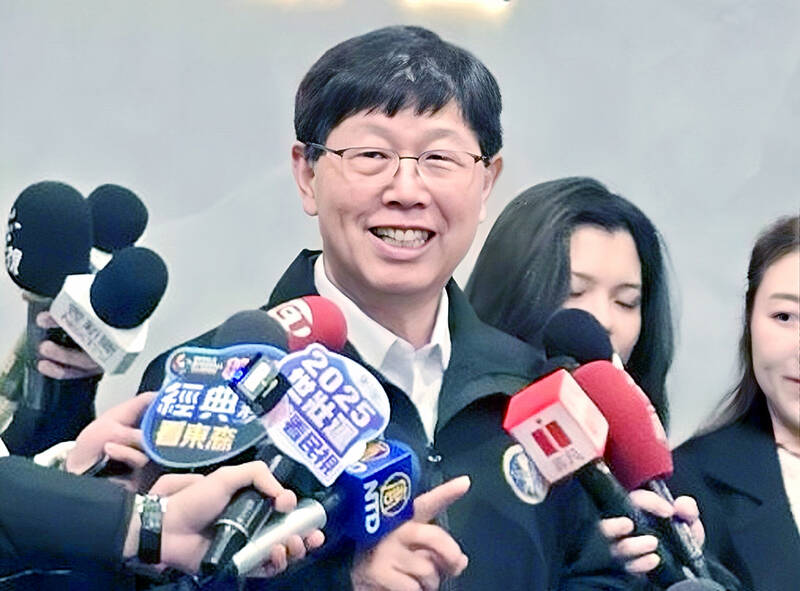Hon Hai Precision Industry Co (鴻海精密) is open to buying Renault SA’s stake in Nissan Motor Co, a move that might offer the struggling Japanese automaker a lifeline.
The Taiwanese company has approached Nissan and Honda Motor Co about potential cooperation, Hon Hai chairman Young Liu (劉揚偉) told reporters yesterday on the sidelines of a company event in New Taipei City.
Liu also said his firm would announce a new Japanese customer for its electric vehicle (EV) contract manufacturing business in the first quarter, although he did not specify the name or scale of production in brief remarks.

Photo: Fang Wei-chieh, Taipei Times
Apple Inc’s main production partner had previously considered picking up the French firm’s 36 percent slice of Nissan.
Hon Hai, for years the largest manufacturer of iPhones and electronics for global brands, has been venturing into newer arenas such as EVs to offset stalling smartphone sales.
The company, known also as Foxconn Technology Group (富士康科技集團), had adopted a wait-and-see attitude while Honda and Nissan worked out a plan to integrate their businesses. The Japanese automakers are now considering ending their alliance talks.
“If there’s an operational need, we will consider it,” Liu told reporters when asked if Foxconn would buy Renault’s stake in Nissan. “But buying the stake isn’t our goal — our goal is cooperation.”
Nissan and Renault declined to comment on Liu’s remarks.
Over the past year, Hon Hai has benefited from surging demand for the Nvidia Corp servers that power artificial intelligence (AI) development. However, in EVs, the world’s largest contract electronics maker has been unable to gain a sure footing.
“From Hon Hai’s point of view, it is not a merger case, but a partnership,” Liu said when asked about a possible merger with Nissan. “How can we partner with Japanese automakers? We met with many companies and Nissan and Honda are among them.”
Meanwhile, US President Donald Trump’s recent introduction of trade tariffs and potential future adjustments are unlikely to have a direct impact on Hon Hai, Liu said.
In response to Trump’s manufacturing initiative, Liu mentioned that Hon Hai is considering establishing new sites in locations across the US in collaboration with its partners.
While Trump’s tariff policy is aimed at reshoring manufacturing to the US, any changes would have a small effect on the manufacturing giant, regardless of whether production is based in Taiwan or the US, Liu said.
However, Liu also acknowledged that tariff hikes could lead to a global market contraction.
In light of this, the company would adjust its high-end AI server production capacity in Taiwan, the US, Mexico and Vietnam as needed, he said.
On the back of its AI server business, Hon Hai is on track to post NT$7 trillion (US$213 billion) in revenue this year, with the potential to approach NT$8 trillion depending on market developments, he added.
Additional reporting by CNA

Application-specific integrated circuit designer Faraday Technology Corp (智原) yesterday said that although revenue this quarter would decline 30 percent from last quarter, it retained its full-year forecast of revenue growth of 100 percent. The company attributed the quarterly drop to a slowdown in customers’ production of chips using Faraday’s advanced packaging technology. The company is still confident about its revenue growth this year, given its strong “design-win” — or the projects it won to help customers design their chips, Faraday president Steve Wang (王國雍) told an online earnings conference. “The design-win this year is better than we expected. We believe we will win

Intel Corp chief executive officer Lip-Bu Tan (陳立武) is expected to meet with Taiwanese suppliers next month in conjunction with the opening of the Computex Taipei trade show, supply chain sources said on Monday. The visit, the first for Tan to Taiwan since assuming his new post last month, would be aimed at enhancing Intel’s ties with suppliers in Taiwan as he attempts to help turn around the struggling US chipmaker, the sources said. Tan is to hold a banquet to celebrate Intel’s 40-year presence in Taiwan before Computex opens on May 20 and invite dozens of Taiwanese suppliers to exchange views

Chizuko Kimura has become the first female sushi chef in the world to win a Michelin star, fulfilling a promise she made to her dying husband to continue his legacy. The 54-year-old Japanese chef regained the Michelin star her late husband, Shunei Kimura, won three years ago for their Sushi Shunei restaurant in Paris. For Shunei Kimura, the star was a dream come true. However, the joy was short-lived. He died from cancer just three months later in June 2022. He was 65. The following year, the restaurant in the heart of Montmartre lost its star rating. Chizuko Kimura insisted that the new star is still down

While China’s leaders use their economic and political might to fight US President Donald Trump’s trade war “to the end,” its army of social media soldiers are embarking on a more humorous campaign online. Trump’s tariff blitz has seen Washington and Beijing impose eye-watering duties on imports from the other, fanning a standoff between the economic superpowers that has sparked global recession fears and sent markets into a tailspin. Trump says his policy is a response to years of being “ripped off” by other countries and aims to bring manufacturing to the US, forcing companies to employ US workers. However, China’s online warriors